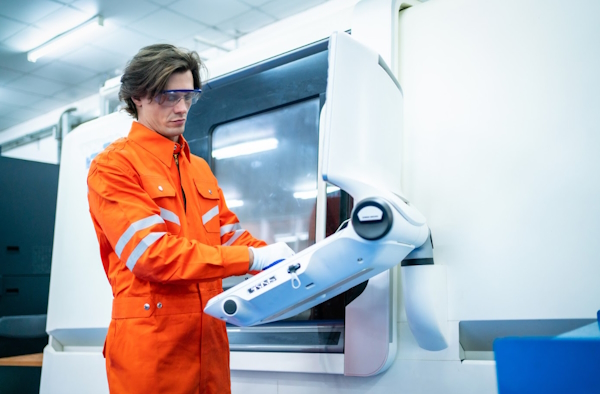Useful Service
 Click here to receive a daily email with new jobs from the 'Useful things to know...' category?
Click here to receive a daily email with new jobs from the 'Useful things to know...' category? (If you are already using this service but have been logged out, simply click here, re-enter your details and we'll email you a login link.)
Contact Information:
Published Content
Email yourself a copy of this job
Click here to see all adverts from Published Content
Click here to receive a daily email with new jobs from the 'Useful things to know...' category?
What Does A CMMS Engineer Do?
As organizations embrace technology-driven solutions, the significance of computerized maintenance management system (CMMS) engineers becomes increasingly recognized in their pursuit of operational excellence and the longevity of industrial assets.
That said, this article will explore CMMS engineers' qualifications and critical responsibilities, unraveling the layers of expertise they bring to the table in modern maintenance management.

Major Qualifications Of A CMMS Engineer
To achieve optimal performance in computerized maintenance management, an engineer must have a distinctive combination of technical proficiency, analytical acumen, and strategic thinking. Below is a compilation of essential qualifications for this role:
Technical Proficiency
At the core of a CMMS engineer's skill set is technical proficiency. This includes a deep understanding of CMMS software platforms, databases, and configurations. These professionals are adept at troubleshooting system issues, ensuring optimal performance, and implementing software integrations with various platforms.
Data Analysis Skills
Given the emphasis on data-driven decision-making, CMMS engineers excel in data analysis. They can extract meaningful insights from maintenance-related data, utilizing built-in CMMS analytics tools to interpret key performance metrics. This skill is crucial for identifying trends, optimizing workflows, and driving continuous improvement.
Project Management Expertise
CMMS engineers often lead or contribute significantly to implementing CMMS within an organization. As project managers, they coordinate tasks, set timelines, and ensure a seamless integration process. Project management expertise is vital for overseeing the configuration, training, and ongoing maintenance of the CMMS system.

Communication And Collaboration
Effective communication is a cornerstone of a CMMS engineer's role. These professionals collaborate with various stakeholders, including maintenance teams, department leaders, and IT personnel. Clear communication is essential for understanding organizational objectives, aligning maintenance strategies, and providing ongoing support and training.
Industry Knowledge
A firm grasp of industry-specific differences is another crucial qualification for CMMS engineers. Understanding the intricacies of the organization's operations, equipment, and maintenance requirements allows these professionals to tailor the CMMS system to meet specific needs. Industry knowledge also enables them to stay ahead of emerging trends and technologies.
Problem-Solving Skills
Maintenance operations can present unexpected challenges, and CMMS engineers are equipped with strong problem-solving skills. Whether addressing system issues, optimizing workflows, or implementing new features, these professionals approach challenges with a solution-oriented mindset.
Key Responsibilities Of A CMMS Engineer
A CMMS engineer assumes diverse responsibilities crucial for the operational efficiency of industrial systems, including:
Overseeing And Administrating The CMMS Software System
CMMS engineers are the primary overseers and administrators of an organization's CMMS software platform. This involves a multifaceted approach, where you monitor the system's performance, configure settings, and develop maintenance workflows.
Furthermore, they are tasked to import asset data, establish user permissions, and manage integrations with diverse platforms, such as accounting, enterprise resource planning (ERP), analytics, and IoT sensors. Their responsibility is to ensure the seamless functioning of the CMMS, guaranteeing optimal uptime and accessibility for authorized users across various devices, such as desktops or mobile devices.
Strategic Maintenance Planning And Scheduling Optimization
A core responsibility of CMMS engineers lies in harnessing the capabilities of CMMS to implement preventative maintenance programs, efficiently schedule work orders, and strategically plan future repairs or replacements for equipment and assets.
Their expertise is crucial in maximizing ‘wrench time’ for technicians, avoiding unexpected downtime through meticulous data analysis, and collaborating closely with department leaders to align maintenance strategies with overarching business objectives.
Tracking Key Performance Metrics For Operational Excellence
Beyond planning and scheduling, you leverage built-in CMMS analytics to extract and interpret key performance indicators (KPIs) related to asset management. This includes metrics like the mean time before failure (MTBF), mean time to recovery, repair, respond, or resolve (MTTR), and work order cycle times.
In addition, technician utilization rate, parts usage, and overall equipment effectiveness (OEE) are also considered. By providing visibility into operational strengths and areas needing improvement, you contribute significantly to driving operational excellence within the organization.
Meticulous Management Of The Master Asset Database
A pivotal responsibility for CMMS engineers is carefully managing the master asset database. This centralized repository contains detailed information on all tracked equipment, parts, components, warranties, specifications, service histories, and associated documentation.
Keeping this database updated is crucial for ensuring that technicians in the field have access to accurate data, facilitating better-informed decision-making for asset-intensive organizations.
Automation And Streamlining Of Maintenance Processes
The inherent advantage of a CMMS lies in its capacity to automate repetitive, manual processes that can otherwise drain productivity in maintenance departments. Drawing on its expertise, a CMMS engineer plays a key role in building workflow automation to simplify routines such as setting up equipment hierarchies, generating recurring PM schedules, dispatching work orders, managing parts inventories, tracking costs, and scheduling technicians.
Implementation Of Tailored Best Practices
Recognizing that each organization is unique, CMMS engineers are instrumental in establishing best practices for asset management tailored to specific environments and objectives. This involves creating guidelines for data organization, setting KPI targets to drive continuous improvement, conducting audits to ensure information stays updated, implementing mobile functionality to remove bottlenecks, and utilizing analytics to optimize everything from energy usage to staffing levels.
Consistent Support And Training Provision
Even after overseeing the initial configuration and rollout of the CMMS, the role extends to being an ongoing resource for troubleshooting issues, providing refresher training on functionality, and guiding feature enhancements to align with evolving business needs.
While managers and other personnel interact with the CMMS daily, the administrator-level visibility allows the CMMS engineer to respond quickly to urgent requests, identify new optimization opportunities, and ensure the continuity of operations.
Conclusion
As organizations navigate the dynamic landscape of maintenance management, the expertise and multifaceted skill set of CMMS engineers play a pivotal role in fostering operational excellence and resilience in the face of evolving industrial challenges. Therefore, it’s best to keep this article as a guide when hiring or recruiting your next CMMS engineer.
Always write down period start date and next invoice date and put them back once you have set up the new advertiser.
Be the First to Apply for Jobs Like This
Newsletter
To sign up up for GlosJobs weekly newsletter, please click here.







